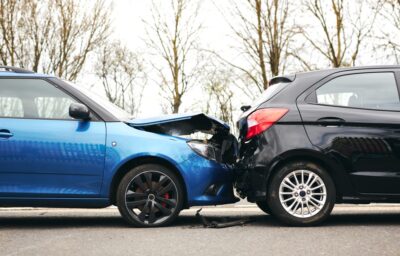
Most rear-end collisions are minor, but when a vehicle is traveling at high speeds just before the crash, even a rear-end accident can cause injuries or death. Rear-end accidents are also widespread, accounting for nearly 1 in 3 car crashes total. Because they’re is so common, state law in Buford offers an easy system to determine fault: the driver of the rear vehicle is almost always liable.
That doesn’t mean that these cases are always straightforward, however. If you have been hurt in a rear-ending, you need to speak with a Buford rear-end collision accident lawyer.
John Foy & Associates has over 20 years of experience dealing with rear-end collision cases. We have a proven method to approach these cases, and a history of getting our clients the most money possible. Our team will investigate the crash, interview witnesses, and deal with the insurance company on your behalf.
We know what it takes to represent you and your interests—and we charge nothing if we don’t get you money. Let us give you a free consultation. Call us at 404-400-4000 and get your free consultation today.
What Are the Most Common Ways that Rear-End Collisions Occur in Buford?
Although rear-end collisions are very common, they usually occur in just a few ways.
- Inattention or distraction. The most common reason (by far) that rear-end collisions occur is that the back driver was simply not paying attention to what was going on in front of them. Drivers can be distracted by any number of things, from passengers to changing the song to reaching for a water bottle or cell phone. Distraction is so prevalent in Bufordthat an insurance company, judge, or jury will often just assume that the driver was distracted if they ran straight into the back of another vehicle.
- Following too closely. Even if the front driver slams on the brakes without warning, the driver who hits them in back will often still be liable. The second vehicle is required to maintain a safe distance from the first vehicle. That distance is not safe if the car could not be stopped when you slam on your brakes. Following too closely to stop is very common, particularly in high-traffic areas.
- Fatigue or intoxication. Both intoxication and fatigue slow down driver reaction time. If someone is too tired to drive, he or she might not be paying close attention to what they’re doing. They may even fall asleep while driving. Drunk drivers also take longer to react than sober drivers. By the time a drunk driver realizes the car ahead of him has stopped, it may be too late to stop their vehicle safely.
- Weather conditions. Heavy rains and fog can cloud a driver’s vision. But not being able to see is not usually a legal excuse to run into the back of another vehicle. If a driver is having trouble seeing, they should pull over until the weather clears. They should also follow at a far enough distance to be able to stop safely, even if there are washed out areas. That means that weather conditions may create the need to stay even further away from other vehicles.
If your situation does not fall into one of these categories, you may still have a claim that you can win in court against the driver that hit you. Your case might simply be more complex than others. In fact, even the driver in back may not be at fault in some cases, and may have a valid claim of their own. No matter what the circumstances of your accident, it’s worth it to reach out to a lawyer in Buford to discuss your legal options.
Get the strong arm
What Are the Most Common Injuries Associated With a Rear-End Collision?
Rear-end accidents can result in a wide variety of injuries. They will vary depending on where the other vehicle struck yours, the speed of the second car, and whether you had time to brace for impact. Neck and back injuries are especially common.
Whiplash, or “hyperflexion,” is exceptionally prevalent after a rear-end collision. Whiplash occurs when the neck is quickly extended to its fullest capacity forward and then backward. The rapid back and forth movement can harm ligaments and tendons in your neck.
Whiplash can result in the following symptoms:
- Pain or stiffness in the neck and shoulders
- Headaches, often in the back of the head, toward the bottom
- Fatigue
- Dizziness
- Lightheadedness
- Blurred vision
It can take days or even weeks to develop symptoms, so it is a good idea to see a doctor after an accident even if you do not feel any immediate pain.
A rear-end collision can also cause significant harm to your spine. The impact can compress it or jar it so that your discs may slip out of place or become pinched. You can also suffer damage to the spinal cord, which is the bundle of nerves that travel through your spinal column. They are protected by your vertebrae, but if your bones are damaged, the nerves can be harmed as well. Damage to this part of the back can affect your ability to move your limbs and feel sensations. These injuries can be very serious.
Your face and head may also be injured in a rear-end collision. Drivers often end up hitting their heads on the steering wheel or dashboard due to a rear-end collision. The force on your head can result in cuts, bruising, and more severe damages, like concussions or other severe head injuries.
Even the equipment designed to protect you can cause injuries in a rear-end collision. Your seatbelt may dig into your hips, ribs, and chest, causing severe bruising and even fractured bones. Airbags can protect you from hitting your head on the steering wheel or dashboard, but they often produce cuts and bruising as well. They may even deploy with such force that you end up with a head injury.
These injuries can be expensive as well as painful—and insurance companies won’t always offer you the full amount you deserve. Always talk to a lawyer before accepting an insurance offer.
Talk to a Buford Rear End Collision Lawyer for Free
Rear-end accidents range from minor to life-altering. What all of them have in common is that the victim has rights—including the right to recover money. Let the team at John Foy & Associates give you a FREE consultation and help you with your case.
Call us at 404-400-4000 or fill out the form to your right and get your FREE consultation today.
(404) 400-4000 or complete a Free Case Evaluation form

